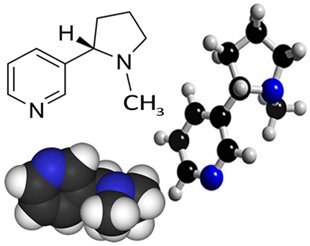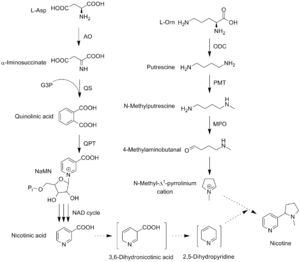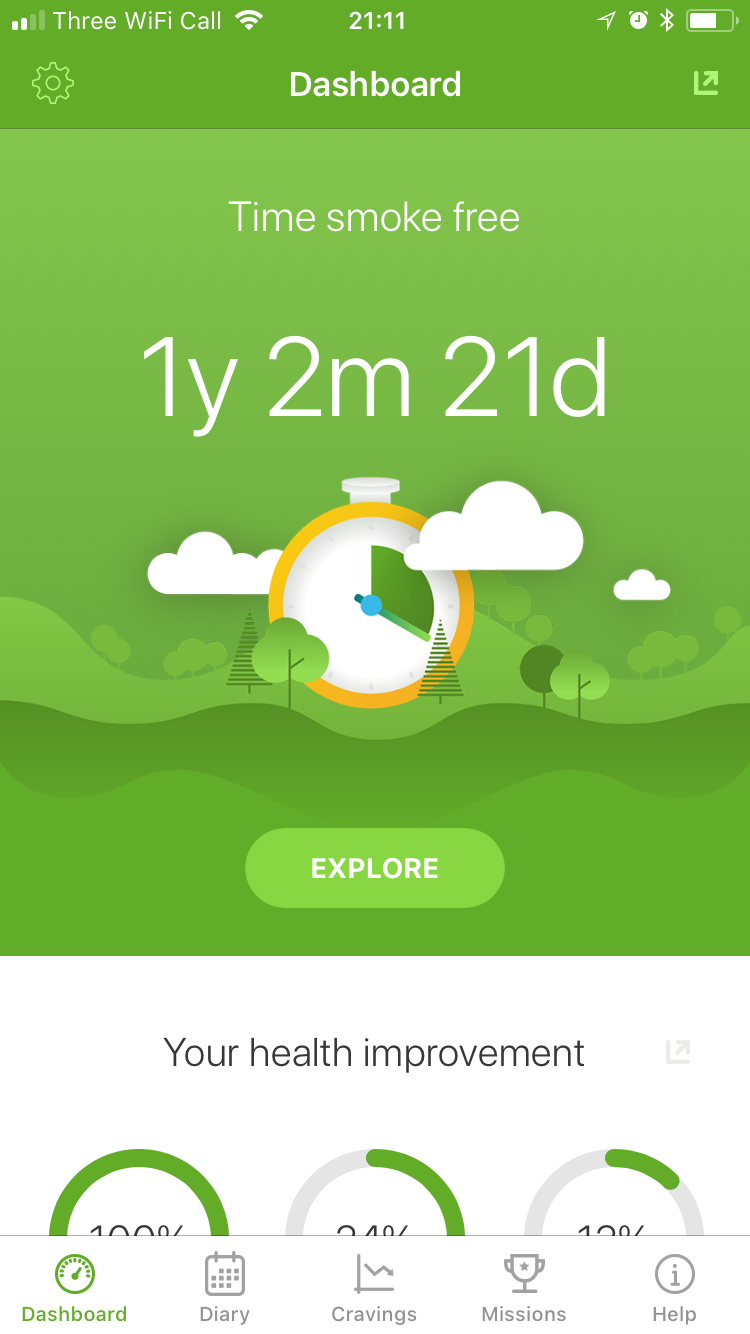
Hello again, today I come with a publication that is very important. It's about nicotine. I do not come to talk about a clinical case that has happened to me, although these cases occur very often, every day people arrive with an overdose of nicotine, for this reason I have taken a little time to make this publication and explain what is .
We are in the 21st century and there is a lot but a lot of information about it, but many people do not care and follow this vice that at any moment can put an end to their lives.
So, smokers who use tobacco regularly are addicted to nicotine, the answer is yes. A study reveals that addiction is characterized by the search and compulsive use of the drug, despite the negative consequences for health. It is well documented that most smokers consider the use of tobacco as a harmful habit and express the desire to reduce or discontinue their use. Each year, nearly 35 million smokers try to kick the habit, but unfortunately, more than 85 percent of those who try to quit without help return, most in a week.
Let's start with this
What is nicotine and why is it so addictive?
The nicotine found in tobacco leaves. When a smoker inhales nicotine, it goes directly to the lungs and blood. In seven seconds, a quarter of the nicotine has reached the brain, through the pulmonary artery. It is a psychoactive drug and a powerful behavioral enhancer, capable of producing severe chemical dependence on the consumer. It acts according to the dose because at low doses it is psychostimulant improving the mental capacity, especially the concentration, and in high doses it has a sedative effect when it acts as a depressant.
One of the most relevant research for me was how nicotine acts in the brain to produce various effects. Of utmost importance in relation to their addictive nature are the findings that nicotine activates the brain circuits that regulate feelings of pleasure, also known as gratification pathways. One of the key chemicals in the brain involved in the desire to consume the drug is the neurotransmitter dopamine. Research has shown that nicotine increases dopamine levels in reward circuits. This reaction is similar to that observed with other drugs of abuse and is believed to be the cause of the pleasurable sensations that many smokers feel. For many tobacco users, long-term changes in the brain induced by chronic exposure to nicotine result in nicotine addiction..
How nicotine is metabolized in our body
Nicotine is metabolized in the liver by means of the group of cytochrome P450 enzymes (CIP) (enzymes that have the function of eliminating substances that are not synthesized by the body itself), and is converted to cotinine to be eliminated in the urine. In humans, 70 to 80% of nicotine is metabolized by CYP2A6, of which three variants have been identified: the normal CYP2A6 * 1, and two others associated with reduced enzyme activity. The presence of abnormal variants among smoking individuals is less frequent than among non-smokers. Those people with abnormal variants smoke fewer cigarettes a day and are more successful in detoxification.
Can be quantified in blood, plasma or urine to confirm a diagnosis of poisoning or to facilitate a forensic autopsy. Concentrations of cotinine in urine or saliva are often measured for the purposes of preemployment medical screening programs and health insurance. Careful interpretation of the results is important, since passive exposure to cigarette smoke can cause a significant accumulation of nicotine, followed by the appearance of its metabolites in various body fluids. Very important, the use of nicotine is not regulated in patients. competitive sports programs.

In this image we can see a urinary metabolite of nicotine, quantified as average percentage of nicotine in total urine.
Chemical preparation

.
Nicotine is a hygroscopic oily, colorless to yellowish brown liquid, which is easily soluble in alcohol, ether or light petroleum. It is miscible with water in its base form between 60 ° C and 210 ° C. As a nitrogenous base, nicotine forms salts with acids that are generally solid and soluble in water. Its flash point is 95 ° C and its autoignition temperature is 244 ° C.
Nicotine is easily volatile (vapor pressure of 5.5 ㎩ to 25 ℃) and dibasic (K b1 = 1 × 10⁻⁶, K b2 = 1 × 10⁻¹¹).
This drug is optically active, it has two enantiomeric forms. The natural form of nicotine is levorotatory with a specific rotation of [α] D = -166.4 ° ((-) - nicotine). The dextrorotatory form, (+) - nicotine is physiologically less active than (-) - nicotine. (-) - nicotine is more toxic than (+) - nicotine. & nbsp; The salts of (+) - nicotine are usually dextrorotative. The salts of hydrochloride and sulphate become optically inactive if they are heated in a closed container above 180 ° C.
With exposure to ultraviolet light or various oxidizing agents, nicotine is converted to nicotine oxide, nicotinic acid (vitamin B3) and methylamine.
relevant data
Beyond addiction, exposure to nicotine in the short and long term has not been established as dangerous for adults, except in certain vulnerable groups. In high enough doses, nicotine is associated with poisoning and is potentially lethal. Nicotine as a tool to quit smoking has a good safety record. There is no adequate research to show that nicotine itself is associated with cancer in humans. Nicotine in the form of nicotine replacement products has less cancer risk than smoking. Nicotine is related to possible birth defects. During pregnancy, there are risks for the child later in life for type 2 diabetes, obesity, hypertension, neurobehavioral defects, respiratory dysfunction and infertility. The use of electronic cigarettes, which are designed to be refilled with nicotine-containing e-liquid, has raised concerns about nicotine overdoses, especially with regard to the possibility of young children ingesting liquids.
Conclusion
As it could be observed in the information obtained Nicotine is not a simple chemical formula that predisposes to "habit" because with precision it can be said that it is a psychoactive drug that produces addiction.Although it is legal and its use is socially accepted, nicotine is a drug with highly detrimental effects on the body, which creates dependence or addiction and creates organic conditions that diminish the quality of life of those who use it, and of those who surround
The consumption of cigarettes is a fundamentally social problem, whose solution requires a global approach, which must be raised from the political framework. Already in 1981 Sir George Young, Minister of Health of the United Kingdom, pointed out that "the solution to smoking will not be found in research laboratories, or in the operating rooms of hospitals, but in the parliaments of democratic nations."
The prevention and control of the tobacco epidemic go through the awareness and social commitment of all. Only in this way will we be able to change the perception that our society has about tobacco consumption and achieve better health for all.
My advice today is that I think more about you, I did not do this post to annoy the smokers, on the contrary it is a contribution that I make to them so that they begin to reconsider and take their decisions.
It is a short but direct post, for the learning of many.
If you want more information below I will leave a video as always and references so that they can continue to gain knowledge.
Ref Information
- Panlilio, LV; Zanettini, C; Barnes, C; Solinas, M; Goldberg, SR (2013). "La exposición previa al THC aumenta los efectos adictivos de la nicotina en ratas
- Andrade, Marisa; Hastings, Gerald. "Reducción del daño del tabaco y productos que contienen nicotina"
- Behnke M, Smith VC (marzo de 2013). "Abuso de sustancias prenatales: efectos a corto y largo plazo en el feto expuesto
- https://www.medicalnewstoday.com/articles/240820.php
- https://science.howstuffworks.com/nicotine.htm
- Ref 1
- Ref 2
- Ref 3
- Ref 4
Thank you for taking the time to read this publication. I hope you have a happy day, see you in the next. Do not forget to leave a comment about what you thought, thank you very much.@juanjdiaz89



Do you work in that place? Thanks for the info
Thank you @juanjdiaz89! I have family members who are/were smokers and apart from being a nasty habit, it probably worsens people´s health (like almost all of them have high blood pressure). Also none but one managed to get away from smoking, and the others get really mad if they do not get a cigarette for several hours (guess that is linked to lowered dopamine levels).
I like your post, however, it would be better if you used citations in your text like just write "(Source 1)" wherever you used a source. Otherwise good work! Cheers!
Thank you for taking the time to read my publication. Now their relatives have the symptom of abstinence. (Soon I'll talk about it) This leads to the fact that they have a very high level of nicotine in the blood from smoking. One of my recommendations for when they want to stop smoking
Go to places where smoking is not allowed. Nowadays smoking is not allowed in stores, cinemas and in many restaurants.
Spend more time with people who do not smoke. You will not have as much desire to smoke if you are with people who do not smoke.
There are many technological treatments, but when they try to apply they reject it.
Thank you very much for your observation.
Hello,
Honestly, your article is very scientific but does not address the innate factors why people smoke, psychological issues, drug abuse nor peer pressure.
I disagree with your reply and will clarify below.
Spend more time with people who do not smoke- You will not have as much desire to smoke if you are with people who do not smoke. - This I disagree with, it only increases your desire to go somewhere else and have your drag, also smokers tend to stay together.
There are many technological treatments, but when they try to apply they reject it. - What technology is available?, Vapour smokes. Skin patches, nicotine gums, nicotine inhalators these are all medical, not much in there. Or is it therapy, that is even weirder. I praise those who try.
Also, people stop smoking because of different reasons. It's not just the technology or walking with other non-smokers, neither going to places where smoking is not allowed. Different strokes for different people.
I disagree with Sir Young, Parliament decisions in banning smoking or increase taxes have been positive but have given another edge in increasing use of cheaper narcotics. Nicotine is been used for centuries, in other forms, however, chemicals added is a negative facet of them. I believe smoking can be minimised, not stopped, by social habits and norms.
Source: Smoker for +15 years, non-smoker for +1 year